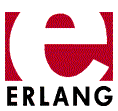Welcome to Erlang/OTP, a complete
development environment
for concurrent programming.
Some hints that may get you started faster
-
The complete Erlang language is described in the
Erlang Reference Manual.
An Erlang tutorial can be found in
Getting Started With Erlang.
In addition to the documentation here Erlang is described in the book "Programming Erlang", ISBN 978-1-934356-00-5, which we highly recommend as a start. During 2009 there are also new Erlang books from O'Reilly and Manning to be expected.
- Erlang/OTP is divided into a number of OTP applications. An application normally contains
Erlang modules. Some OTP applications,
such as the C interface erl_interface, are written in other languages and have no Erlang
modules.
Note that functions that are not imported or prefixed with a module name belong to the module erlang (in the Erts application).
- On a Unix system you can view the manual pages from the command
line using
% erl -man <module> - You can of course use any editor you like to write Erlang
programs, but if you use Emacs there exists editing support such as
indentation, syntax highlighting, electric commands, module name
verification, comment support including paragraph filling, skeletons,
tags support and more. See the
Tools application for details.
There is also an Erlang plugin (ErlIde) for Eclipse if you prefer a more graphical environment. ErlIde still under active development with new features in almost every release.
- When developing with Erlang/OTP you usually test your programs
from the interactive shell (see
Getting Started With Erlang) where you can call individual
functions. There is also a number of tools available, such as the graphical Debugger, the process
manager Pman and table
viewer TV.
Also note that there are some shell features like history list (control-p and control-n), in line editing (emacs key bindings) and module and function name completion (tab) if the module is loaded.
- OpenSource users can ask questions
and share experiences on the
Erlang questions mailing list.
- Before asking a question you can browse the
mailing list archive and read the Frequently
Asked Questions.
- Additional information and links of interest for Erlang programmers can be found on the Erlang Open Source site
http://www.erlang.org.
